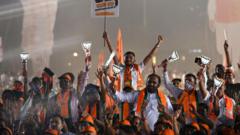In Maharashtra, India, turmoil erupted following a hard-line Hindu group’s demand for the demolition of a 17th-century Mughal ruler, Aurangzeb’s tomb. The clashes, primarily in the city of Nagpur, were triggered on a significant date in Hindu tradition, a day that honors Chhatrapati Shivaji, a revered king who opposed Aurangzeb.
The Vishwa Hindu Parishad (V.H.P.) led the protests, calling for the tomb's removal and sparking violent encounters with the Muslim community. Protesters burned an effigy of Aurangzeb, highlighting ongoing animosities rooted in historic grievances. The clash required a curfew to restore order, though the demands to dismantle the tomb remain unfulfilled.
This incident reveals how right-wing factions leverage history to amplify current tensions against India's sizable Muslim population. The protests echoed a broader narrative within Indian politics, where historical figures are invoked to galvanize support and assert political agendas in today's society. The communal violence underscores a deep-seated rift that continues to shape inter-religious relationships in the region.























